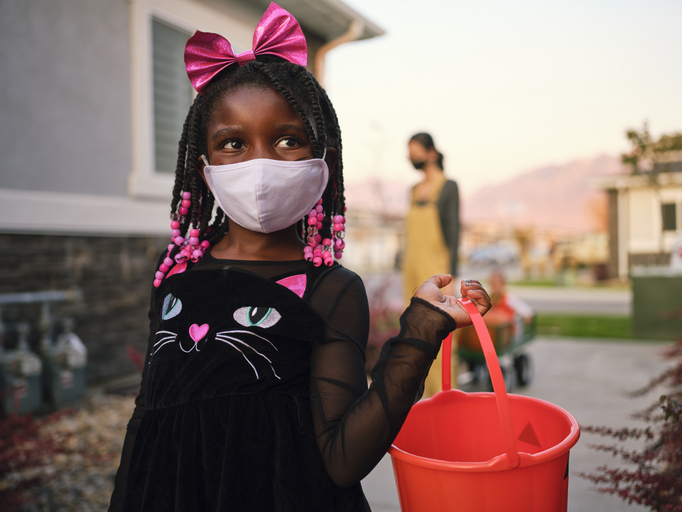
Source: RichLegg / Getty
As the season changes, the masks are coming back out. Sickness is running rampant and Covid-19 is on the rise again. Now, there’s a new vaccine that boasts better protection. Check out 10 things you should know before getting the updated vaccine inside.
Though the virus has been causing mild illness lately, a Yale Medicine infectious diseases specialist named Onyema Ogbuagu, MBBCh, reminds people that the disease can still lead to hospitalization and death.
“Infections can have long-term consequences,” Dr. Ogbuagu shares in an article posted on Yale Medicine.
Dr. Ogbuagu also adds that even the healthiest people can develop “long COVID,” which is new, continuing, or recurring (and sometimes debilitating) symptoms are present four or more weeks after an initial coronavirus infection.
Yale experts explained 10 things people should know about the updated COVID vaccine below:
Why would another COVID vaccination help?
The updated vaccines are not expected to prevent all cases of COVID, including those causing mild illness; rather, their aim is to reduce severe illness, hospitalization, and death from infection. According to the CDC, COVID is still a major cause of serious respiratory illness, with more than 200,000 reported deaths since January 2022. That figure includes more than 600 deaths in adolescents and children ages 19 and younger.
How is the updated COVID vaccine different from the previous one?
The bivalent booster, which is no longer available, was introduced in the fall of 2022. It targeted the BA.4 and BA.5 Omicron subvariants and the original SARS-CoV-2 virus. The new vaccine is monovalent, designed to prevent severe disease from the Omicron XBB.1.5 subvariant. By September, the long-running XBB.1.5 accounted for only about 3 percent of cases in the U.S., but most of the strains circulating now are descended from (or closely related to) it.
That’s a good example of how the virus has evolved—and it’s still evolving—so rapidly that it may be impossible to match each new vaccine update to the variants circulating at the time it is released, explains Scott Roberts, MD, a Yale Medicine infectious diseases specialist.
“But we know from experience that the vaccines hold up very well, even against multiple variants, unless there is a significant shift like we saw with Delta to Omicron in the winter of 2021,” he says. “Basically, if you have some immunity to a variant and are exposed to a new offshoot of it, you’ll have some protection.”
Why isn’t the new COVID vaccine considered a booster?
The FDA is calling the new shots “updated vaccines” in anticipation of needing to provide updated formulas annually, similar to the flu shot, which changes each year.
A booster shot gives a “boost” to the recipient’s existing immunity from a previous vaccination. Updated vaccines are different in that they are expected to provide protection against currently circulating variants, helping the body build a new response to those variants.
Will this COVID shot protect against Omicron strains EG.5 and BA.2.86?
It’s a good question, considering EG.5 made up 29.4 percent of cases at the end of September, more than any other SARS-CoV-2 virus strain at the time, followed by another XBB descendent called FL 1.51, which accounted for 13.7 percent of cases. “The XBB characteristics of the shot are genetically similar to EG.5,” Dr. Roberts says. “They’re not identical, but they’re pretty close. So, there’s going to be protection with the updated vaccine.”
There is still more to learn about BA.2.86, which appeared in the U.S. in August and is not reported to be widespread in this country at this point. The multiple mutations to its spike protein could be a sign that it is more transmissible or could cause more severe disease, although so far, nobody knows for sure. However, the CDC says the new shots should work against the new strain.
How safe is the updated COVID vaccine?
The benefits of the COVID-19 vaccine continue to outweigh any potential risks, and serious reactions after COVID-19 vaccination are rare, according to the CDC. The agency cited a study showing the risk of cardiac complications, including myocarditis (an inflammation of the heart muscle), in males 12-17 years old was 1.8–5.6 times higher after a COVID-19 infection than after COVID-19 vaccination.
Are there any special COVID vaccine recommendations for children?
The FDA approved the updated mRNA vaccines for adolescents and teenagers ages 12 and older and authorized them for emergency use in children ages 6 months through 11 years.
Children are less likely to get seriously ill with COVID, but some still do, says Magna Dias, MD, a Yale Medicine pediatric hospitalist. She tells parents who are still not sure whether they should get the vaccine for their children to talk to their pediatrician, especially if their child is immunocompromised. “In that case, I think it’s a no-brainer to protect them,” she says.
Is there an updated COVID vaccine from Novavax?
The FDA authorized an updated version of a vaccine Novavax developed to target the XBB.1.5 strain. Individuals 12 and older previously vaccinated with a COVID-19 vaccine (and who have not already been vaccinated with a recently updated mRNA COVID-19 vaccine) are eligible to receive one dose; unvaccinated individuals can receive two doses.
According to the FDA, the updated vaccine addresses currently circulating variants to provide better protection against serious consequences of COVID-19, including hospitalization and death.
The Pfizer-BioNTech and Moderna vaccines use messenger RNA (mRNA) technology, which instructs the body’s cells to make proteins that trigger an immune response against COVID-19. The Novavax protein-based vaccine uses an older, more traditional technology and a different mechanism—it directly injects the spike protein (formulated in a laboratory) and another ingredient into the body, leading to the production of virus-fighting antibodies and T cells. The Novavax vaccine is the only non-mRNA COVID-19 vaccine available in the U.S.
When should I get the updated COVID vaccine?
Dr. Roberts encourages people to get their shot in October for immunity that will last through the middle of winter, when cases are expected to peak. The shot will boost immunity within two weeks, and maximal vaccine protection is usually in the first three months after the shot, he says. “I would say October is when you want to start thinking about getting it, anticipating that November, December, and January will be the rough period.”
Should I get the updated COVID vaccine and other seasonal shots at the same time?
The CDC considers it safe to get the COVID shot and annual flu vaccine simultaneously. There is even research in progress to explore the effects of administering both vaccines in a single shot.
But the respiratory syncytial virus (RSV) vaccines for older adults and pregnant women (who can pass the antibodies along to their newborns) are brand new this fall, and there isn’t data to say for sure whether giving those at the same time as the other two shots is the best strategy.
Where can I get the updated COVID vaccine?
As with previous COVID-19 vaccines, this one will be available at participating pharmacies and provider offices. To find a location near you that carries the vaccine and to schedule an appointment, go to Vaccines.gov. You can also call 1-800-232-0233 (TTY 1-888-720-7489). Be aware that current distribution and insurance issues may delay availability of the vaccines temporarily in some places.
According to the CDC, the vaccines are covered by insurance, including private insurance, Medicare plans, and Medicaid plans. Uninsured children and uninsured adults also have access through the Vaccine for Children Program and Bridge Access Program, respectively.
Though this information has been provided by Yale medical experts, we advise you still consult your own medical profession before taking the updated vaccine or making any health related changes.
Protect Yourself: 10 Things To Know About The Updated Covid-19 Vaccine was originally published on globalgrind.com














